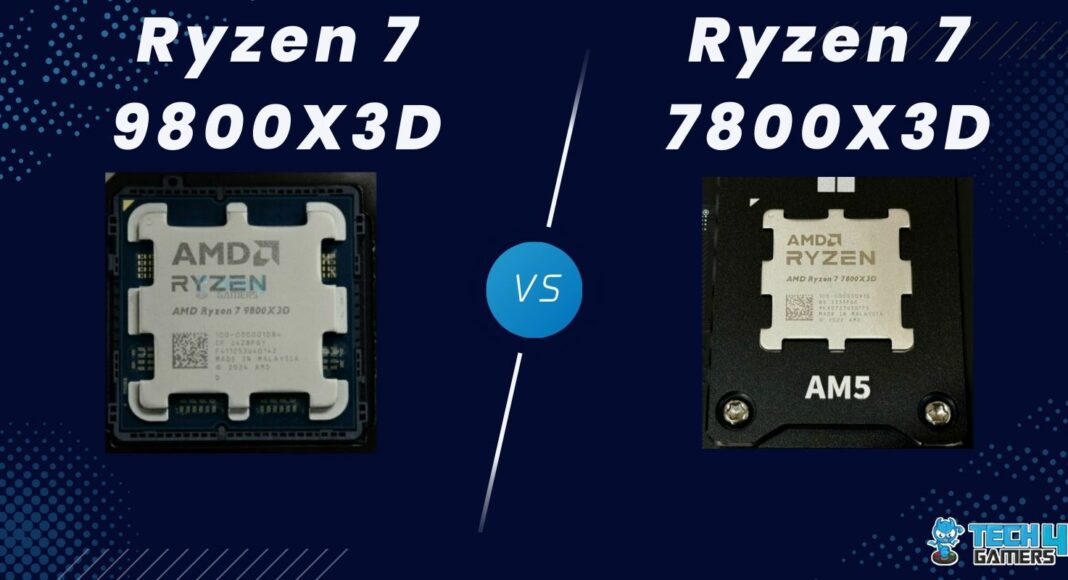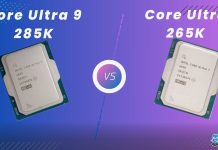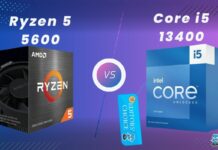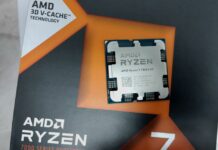AMD Ryzen 7 9800X3D Rated: 9.3/10 AMD Ryzen 7 7800X3D Rated: 9/10
Pros And Cons
| CPU | Pros | Cons |
|---|---|---|
| AMD Ryzen 7 9800X3D | ✅ Comes with 96MB of L3 Cache ✅ Equipped with 8 Cores | ❌ Increased Power Consumption |
| AMD Ryzen 7 7800X3D | ✅ Improved Power Efficiency ✅ Compatible with DDR5 Memory | ❌ Low Thermal Efficiency |
Comparison Table
| Feature | AMD Ryzen 7 7800X3D | AMD Ryzen 7 9800X3D |
|---|---|---|
| No. of Cores | Total: 8 | Total: 8 |
| No. of Threads | 16 | 16 |
| Base Clock | 4.20 GHz | 4.7 GHz |
| Boost Clock | Max Turbo: Up to 5.0GHz | Max Turbo: Up to 5.2GHz |
| Integrated Graphics | AMD Radeon Graphics | AMD Radeon Graphics |
| Best Motherboard | Best Motherboards For Ryzen 7 7800X3D | Best Motherboard For Ryzen 7 9800X3D |
| Best RAM | Best RAM For Ryzen 7 7800X3D | Best RAM For Ryzen 7 9800X3D |
| Best Cooler | Best CPU Coolers For Ryzen 7 7800X3D | Best CPU Cooler For Ryzen 7 9800X3D |
| Processor Review | AMD Ryzen 7 7800X3D Review | AMD Ryzen 7 9800X3D |
Architectural Differences
- Core Count: Although from different generations, both processors come equipped with 8 cores, and the threads follow the same pattern having 16 each.
- Clock Speed: Regarding clock speeds, the 7800X3D comes with a 4.20 GHz base clock and a 4.7 GHz up to boost clock speed. On the other hand, the 9800X3D improves this by offering a 4.2GHz base clock and a 5.2GHz up-to-boost clock.
- Cache: Similar to clock speeds, both the processors utilize a shared 96 MB of L3 Cache and 1 MB of L2 Cache per core respectively. But the 9800X3D takes a slight edge in L1 cache, using 80 KB per core instead of 64 KB.
- Process Node: The 7800X3D utilized a 5nm process node, which has been further optimized in the 9800X3D with a 4nm process node enhancing efficiency.
- TDP: Both the chips come with the same TDP rating of 120 W, which on chart shows their identical power consumption levels but this will be further tested in gaming scenarios.
The recent launch of the Ryzen 9000 series from AMD has received its fair share of criticism as the overall series has been considered a flop. But the company has finally decided to release its infamous X3D lineup to improve its image. In this article, we will be testing the Ryzen 7 9800X3D vs Ryzen 7 7800X3D.
Gaming Benchmarks – 1080p
To get the most accurate and precise results, we will be testing both of these processors in a series of gaming benchmarks. So if your main purpose of getting these processors is to game, these tests will help you solidify your decision on which one to get for your system. Furthermore, the following testing rig has been used for these benchmarks.
Test Bench
- OS – Windows 11
- CPU Cooler – Enermax LiqMaxFlo 360mm
- Graphics Card – GIGABYTE RTX 4090 Gaming OC 24G
- SSD – XPG Gammix S50 Lite
- Power Supply – be quiet! Dark Power Pro 13 1300W
- Mobo (AMD) – ASRock X870E Taichi Lite
Cyperpunk 2077

- Starting the first game, the Ryzen 7 9800X3D gave me about 158 FPS, while the Ryzen 7 7800X3D averaged around 143 FPS. That’s a noticeable 9.9% advantage, making gameplay feel just a bit smoother on the 9800X3D.
- For those tough moments, the Ryzen 7 9800X3D held up with 120 FPS in the 1% lows, while the 7800X3D dipped down to 108 FPS around a 10.5% difference. It’s a small boost but does make things feel more stable.
Microsoft Flight Simulator

- In Flight Simulator, the 9800X3D came out ahead with 145 FPS compared to 127 FPS on the 7800X3D. That’s a 13.2% difference, which is quite nice for smoother visuals in such a demanding game.
- Moreover, in 1% lows, the 9800X3D stayed strong with 111 FPS, whereas the 7800X3D was around 71 FPS, a more significant 43.9% difference that helps keep the game stable in intensive scenes.
Hogwarts Legacy

- Playing Hogwarts Legacy, I got about 103 FPS on the 9800X3D and 86 FPS on the 7800X3D. That’s around a 17.9% difference, which helps the game look smoother on the higher-end processor.
- The 9800X3D managed 56 FPS in the 1% lows compared to 47 FPS on the 7800X3D, giving it a slight but noticeable edge of 17.4% in handling dips.
Forza Horizon 5

- In Forza Horizon 5, the Ryzen 7 9800X3D averaged around 271 FPS, just slightly higher than the 7800X3D’s 263 FPS. The difference is only 2.9%, so both give a pretty smooth experience.
- When it came to 1% lows, the 9800X3D scored 202 FPS, while the 7800X3D had 173 FPS a difference of 15.4% that you might feel in high-speed scenes.
Ghost of Tsushima

- Running Ghost of Tsushima, the 9800X3D pulled off 219 FPS compared to the 7800X3D’s 197 FPS, a 10.5% difference. That makes for a subtly smoother experience on the 9800X3D.
- With 1% lows following a similar picture, the 9800X3D was at 192 FPS, while the 7800X3D was closer to 164 FPS, giving the newer processor a 15.7% boost for consistency.
Starfield

- In Starfield, I saw 133 FPS on the 7800X3D, but the 9800X3D pushed ahead with 153 FPS creating a 13.9% difference, enough to make the gameplay slightly more fluid.
- For the 1% lows, the 9800X3D achieved 126 FPS compared to 102 FPS on the 7800X3D. This 21% gap is quite noticeable, especially in Starfield’s denser areas.
God of War Ragnarok

- Playing God of War, both processors performed closely, with the 9800X3D at 346 FPS and the 7800X3D at 338 FPS only a small 2.3% difference, so either one handles this game beautifully.
- In 1% lows, the 9800X3D showed 227 FPS, while the 7800X3D dropped a bit more to 213 FPS. The difference is small just amounting to 6.3%, but it’s there if you’re really looking.
The Witcher 3

- In The Witcher 3, I got around 116 FPS on the 9800X3D, while the 7800X3D hit 100 FPS, a 14.8% advantage on the newer chip that smooths out Geralt’s adventures.
- Checking the 1% lows, the 9800X3D maintained 102 FPS, while the 7800X3D dropped to 70 FPS. That’s a significant 32.3% difference, making the 9800X3D feel a lot more stable in heavy scenes.
Productivity Benchmarks
Since the gaming benchmarks are out of the way, let’s test these processors based on their productivity scores so that users can get additional insights into their performance.
Cinebench R24

- Running Cinebench R24, I noticed a nice bump in both single-core and multi-core scores with the Ryzen 7 9800X3D. In single-core, it hit 133 compared to the 7800X3D’s 115, which made everything feel just a bit snappier.
- But the real difference showed up in multi-core tasks, where the 9800X3D scored 1354 over the 7800X3D’s 1108. That extra power in multi-core really stands out in heavy workloads, making multitasking and rendering noticeably faster.
Adobe Photoshop 2025

- In Photoshop, the 9800X3D scored 12073, outperforming the 7800X3D, which scored 10363. This 1710-point boost means smoother performance in Photoshop, especially with complex layers and filters.
Blender

- Testing Blender, the 9800X3D rendered at 333.2, significantly faster than the 7800X3D’s 265.9. That’s about a 67.3-point advantage, which really cuts down render times in 3D work.
Overall Performance
Average Framerate
During my testing, the results came up with an 8.5% average gaming performance difference between the processors which doesn’t seem something really worth upgrading over. In some games, there was barely a difference of 2.9% strengthening my claim even further.
1% Lows
While checking the 1% lows I noticed a bigger percentage, with the two processors showing a difference of 17.6%, which does showcase the capability of the 9800X3D as a more stable option.
Productivity
When it came to productivity both processors performed exceptionally, with the 9800X3D having a slight edge in Cinebench 24, and a major one of 22.4% in Blender showcasing its productivity capabilities.
Power
| Game | Ryzen 7 7800X3D | Ryzen 7 9800X3D |
|---|---|---|
| Cyberpunk 2077 | 68 | 87 |
| Microsoft Flight Simulator | 52 | 68 |
| Hogwarts Legacy | 56 | 71 |
| Forza Horizon 5 | 60 | 78 |
| Ghost of Tsushima | 55 | 69 |
| Starfield | 74 | 94 |
| God of War Ragnarok | 70 | 85 |
| The Witcher 3 | 60 | 70 |
| Average Power Draw | 61.8⚡ | 77.7⚡ |
| Winner: Ryzen 7 7800X3D |
As I was testing these processors, one of the things that came to light was the higher power consumption on the 9800X3D, which is quite surprising seeing how it is thermally more efficient than the 7800X3D which utilizes 22.7% less power.
Price
| CPU | Ryzen 7 7800X3D | Ryzen 7 9800X3D | Price Difference |
|---|---|---|---|
| Launch MSRP | 💲449 | 💲479 | 6.4% |
| Current Price | 💲474 | 💲479 | 1% |
Although both processors came with a close retail price, due to the shortage of the new generation chips the prices have skyrocketed and some scalpers are selling it with as much as 30-40% price hike, which makes the situation worse if the available units get sold out.
What We Recommend
AMD Ryzen 7 7800X3D: According to my testing results and research, the 7800X3D is still an exceptional option for anyone looking for a significant performance bump while not breaking the bank.
AMD Ryzen 7 9800X3D: On the flip side, the 9800X3D does pack a punch when it comes to gaming, productivity, thermal efficiency, and overclocking due to the recent change in its chipset, but because of its shortage, the prices have hiked significantly which is a major concern.
In my opinion, anyone currently using the 7800X3D processor for anything higher than 1080p doesn’t need to switch as the difference in performance is not worth it considering the price difference. But if you are coming from an old-gen processor, then I would recommend the 9800X3D.
Yes, the Ryzen 7 9800X3D supports overclocking, allowing users to push the processor’s limits for even higher performance, though cooling requirements should be considered. The Ryzen 7 9800X3D uses the AM5 socket, is compatible with AMD’s latest motherboards and supports advanced features like PCIe 5.0 and DDR5 memory. The Ryzen 7 7800X3D performs well in creative applications, managing tasks like video editing and rendering efficiently, making it a solid choice for creative professionals. The Ryzen 7 9800X3D is designed with energy efficiency in mind, balancing high performance with optimized power consumption, especially in lower-power workloads. Yes, the Ryzen 7 7800X3D supports DDR5 memory, allowing for faster data transfer speeds and improved overall system performance with compatible RAM. FAQs
More From Ryzen 7 7800X3D
Thank you! Please share your positive feedback. 🔋
How could we improve this post? Please Help us. 😔
[Comparisons Expert]
Shehryar Khan, a seasoned PC hardware expert, brings over three years of extensive experience and a deep passion for the world of technology. With a love for building PCs and a genuine enthusiasm for exploring the latest advancements in components, his expertise shines through his work and dedication towards this field. Currently, Shehryar is rocking a custom loop setup for his built.
Get In Touch: shehryar@tech4gamers.com



![Intel i9-13900k Vs Ryzen 9 7900X [Benchmarks Tested] Intel Core i9-13900k Vs AMD Ryzen 9 7900X](https://tech4gamers.com/wp-content/uploads/2022/10/Intel-Core-i9-13900k-Vs-AMD-Ryzen-9-7900X-218x150.jpg)



![Core i5-14600k Vs Ryzen 7 7800X3D [10 Games Tested] core i5 vs 7800x](https://tech4gamers.com/wp-content/uploads/2024/11/core-i5-vs-7800x-218x150.jpg)